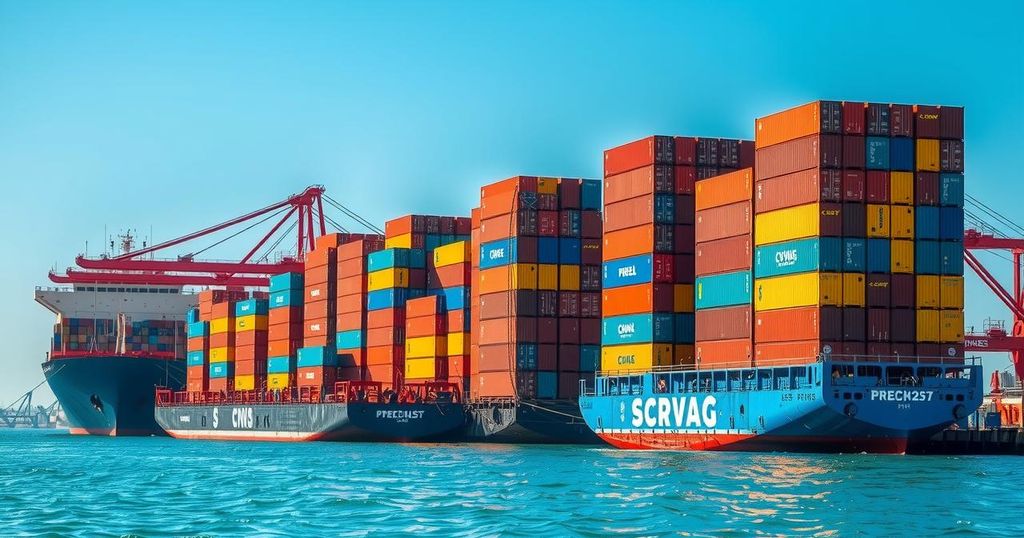CK Hutchison’s Panama Canal Ports Sale to BlackRock Triggers Chinese Backlash

CK Hutchison’s sale of Panama Canal ports to BlackRock has incited severe criticism from China. The $23 billion deal heightens geopolitical tensions amid US efforts to curtail Chinese influence in Latin America. Chinese media accuse Hutchison of prioritizing profits over national security. The situation leaves Hutchison caught between two superpowers, as both Beijing and Washington exert pressure on the company’s decision.
CK Hutchison Holdings, based in Hong Kong, has faced significant backlash from Beijing following its sale of stakes in the Panama Canal ports to American investment firm BlackRock for $23 billion. This deal, announced recently, increases geopolitical frictions, prompting Chinese authorities to issue stern warnings against cooperation with American entities.
The divestment is notable as Hutchison has chosen to sell nearly all of its international port interests, maintaining only those in China. The sale encompasses 43 container ports across 23 nations, including the strategically significant Balboa and Cristobal docks, and will provide Hutchison with $19 billion in cash.
Following increased pressures from the US government, including remarks from President Donald Trump regarding Chinese dominance over vital waterways, analysts suggest that external diplomatic forces may have influenced Hutchison’s decision to divest. Washington’s efforts to diminish China’s influence in Latin America seem to have intensified recently.
Chinese state-run media has expressed strong criticism towards Hutchison, accusing the company of prioritizing profits over national security. A commentary published by Ta Kung Pao, which was also circulated by Beijing’s liaison offices, indicated that the sale serves American interests at China’s expense and warned that such alignment could harm Hutchison’s standing and future opportunities in China.
Hutchison now faces a precarious situation between the United States and China. If the company retracts its sale, it may appear to yield to Beijing’s pressures, potentially endangering its standing in the US. Conversely, if the deal proceeds, it could attract regulatory scrutiny in China, jeopardizing Hutchison’s other business endeavors.
Historically, China’s government has preferred businesses that align with national objectives. The recent censure from Beijing recalled the example of industrialist Chao Kuang-piu, who is noted for placing China’s economic interests above personal financial risk, sending a clear message that business interests must not override national priorities.
Despite being a prominent player in global finance, BlackRock has chosen to maintain a low profile regarding the transaction. The firm manages assets totaling $11.5 trillion and has significant interests in China and Hong Kong. The CEO, Larry Fink, has established connections with President Trump through previous business engagements, and while BlackRock is accustomed to scrutiny over its ventures in China, its latest foray into the Panama Canal operations has triggered fresh geopolitical alarms.
As opposition from Beijing escalates, the transaction may encounter regulatory scrutiny or diplomatic pressures. Should the sale be completed, it represents a significant strategic victory for the United States, further consolidating its presence in the Panama Canal. On the other hand, if Hutchison bowing to Chinese influence results in halting the deal, it would reinforce Beijing’s control over critical infrastructure deals globally. At this juncture, CK Hutchison remains entangled in a high-stakes contest of influence between two leading world powers.
In summary, CK Hutchison Holdings’ sale of Panama Canal ports to BlackRock has drawn considerable ire from China, sparking potential regulatory scrutiny and highlighting the intricate balance companies must navigate between US and Chinese interests. The unfolding geopolitical ramifications of this deal reflect a broader struggle for influence in global trade infrastructure, with the potential for it to reshape future business relations in the region.
Original Source: www.business-standard.com








